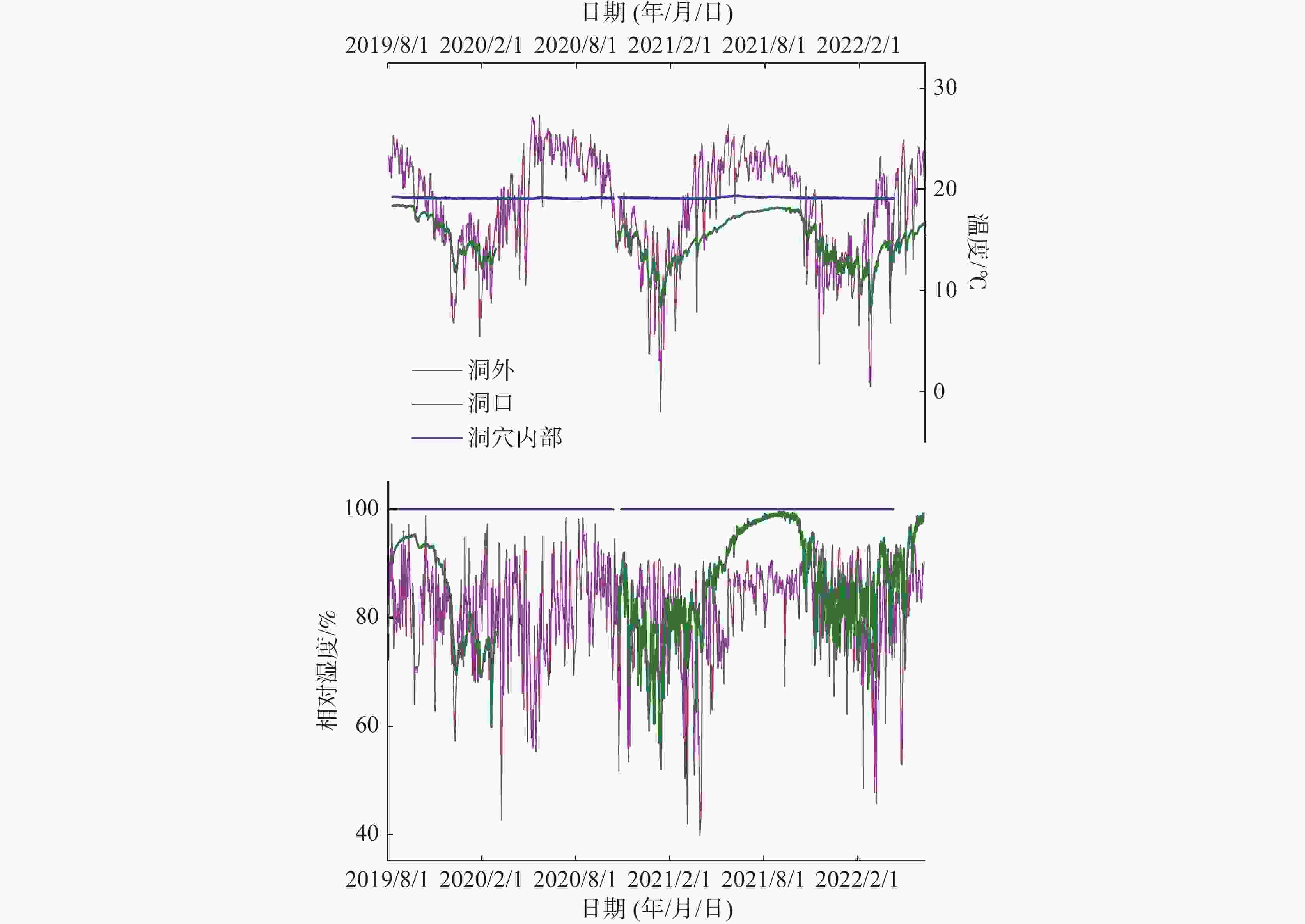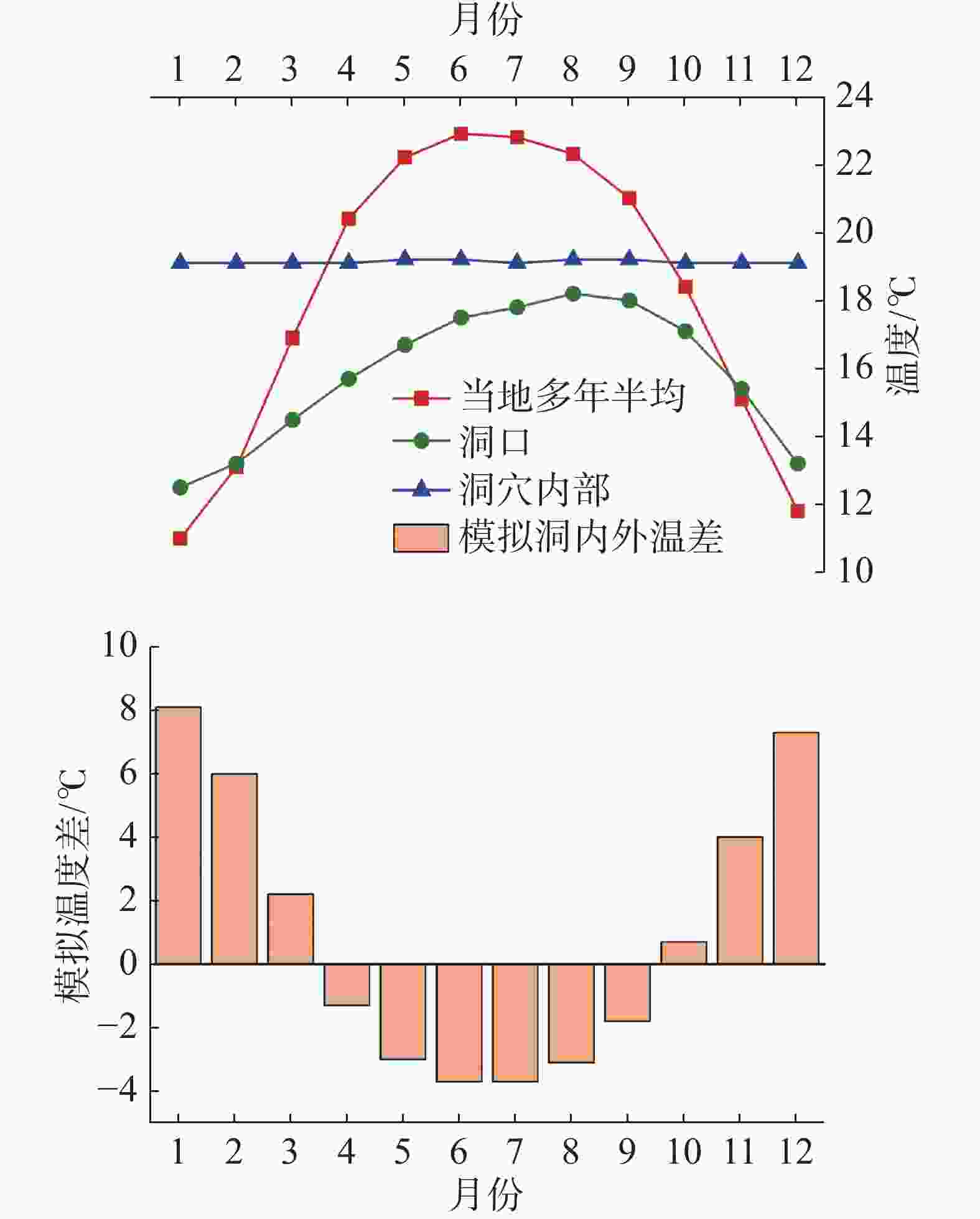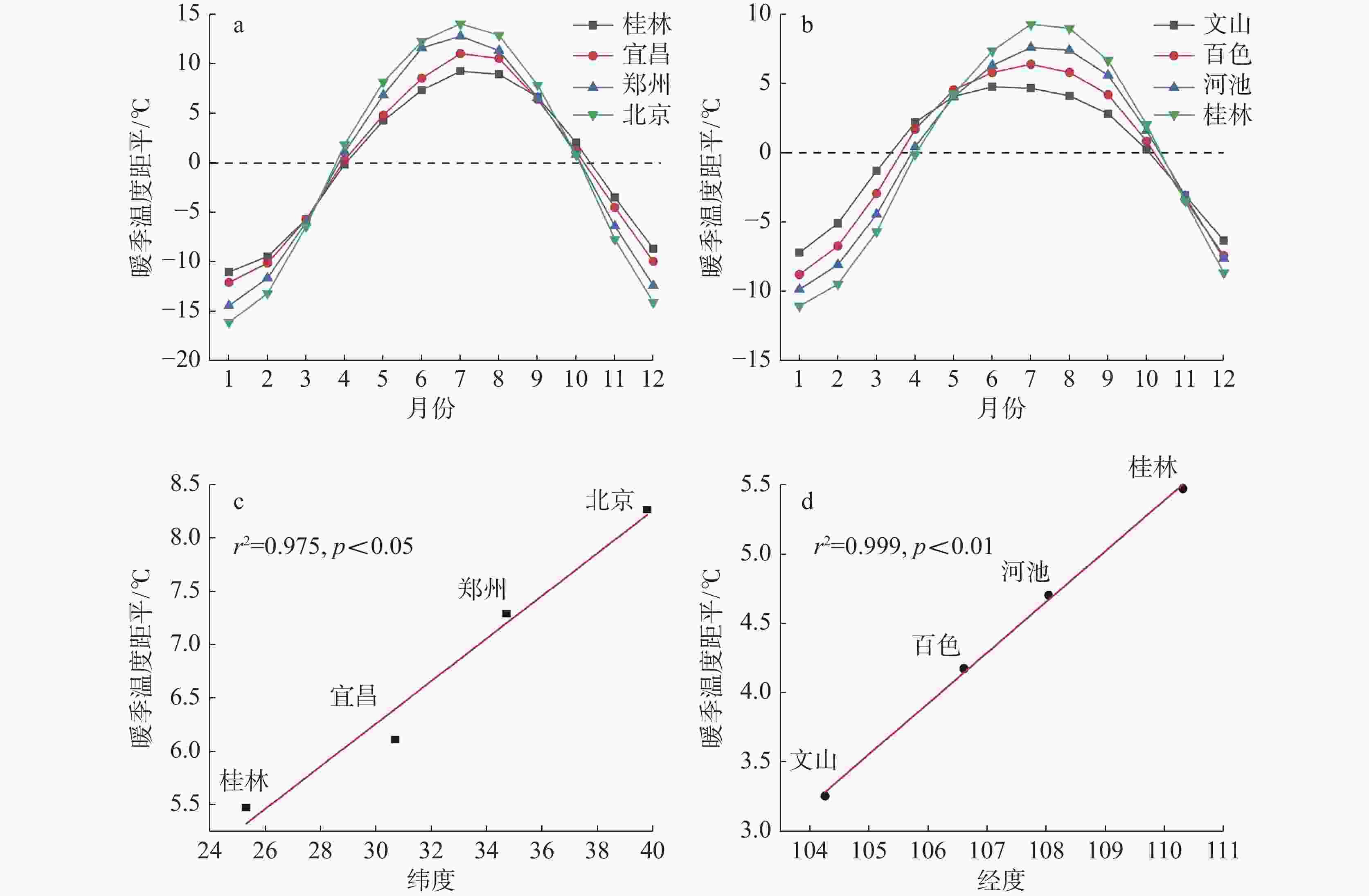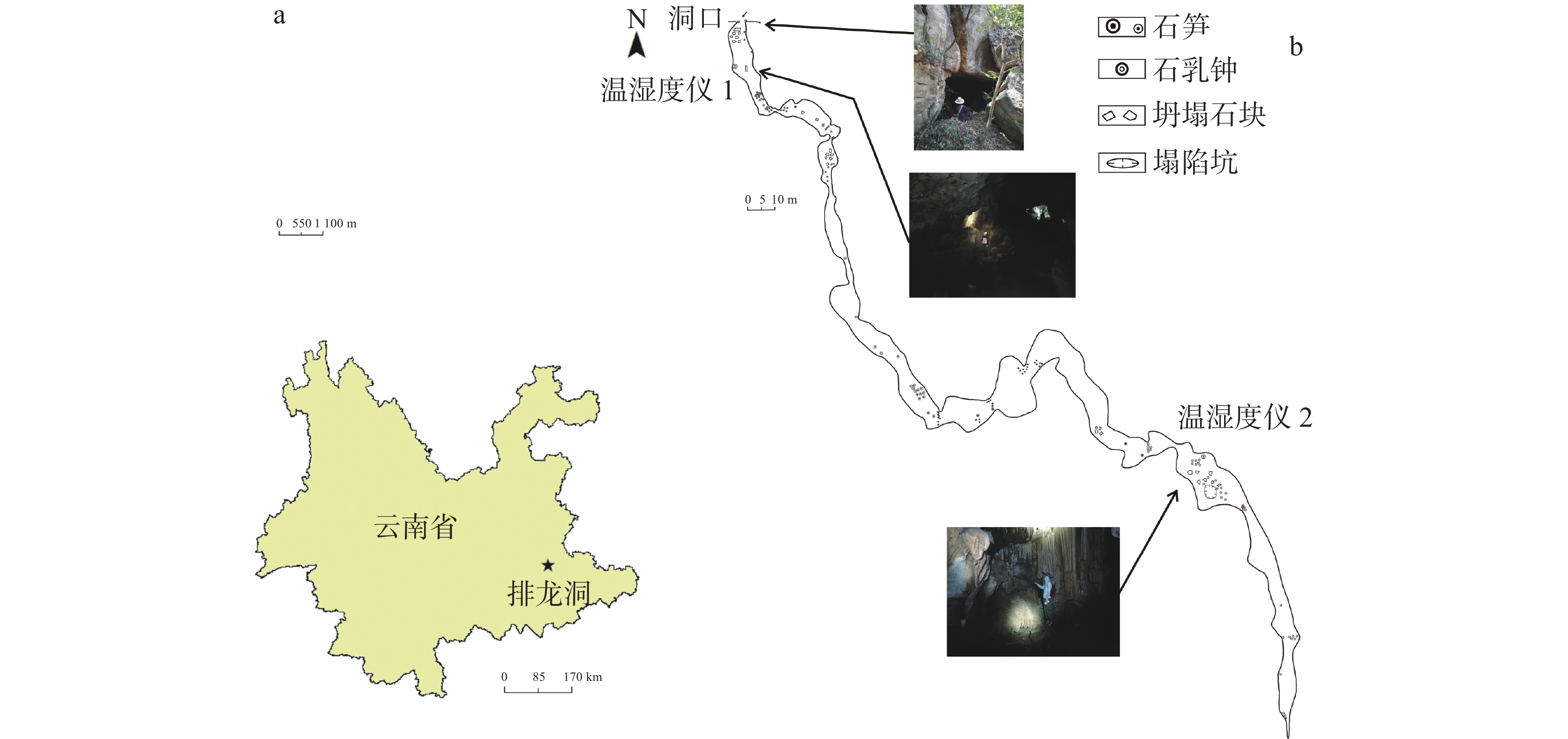Relationship between temperatures of karst caves and local average temperatures: Taking Pailong cave of Puzhehei, Yunnan as an example
-
摘要: 一般而言,岩溶洞穴温度等于当地多年平均气温,但实际监测中发现,不同地区洞穴温度与当地多年平均气温的关系并不一致。为更好地认识岩溶洞穴温度与当地多年平均气温的关系,对云南普者黑排龙洞洞穴内部及洞口温湿度进行连续高频监测,发现平均温度呈现洞穴内部>洞外>洞口的空间特征。洞口温度主要受洞穴通风效应影响,而洞穴内部温度则主要受到温度和降水的季节分布影响。结合我国已探究洞穴的洞穴内部温度与洞外气温进行比较分析得出:就大的空间尺度而言,洞穴温度同当地多年平均气温一样都与纬度呈现显著的负相关,而洞内外温差与纬度呈现显著的正相关关系。通过分析不同区域气象数据发现,洞内外温差的变化与当地暖季(4-10月)温度距平显著相关,暖季时间越长,暖季温度距平越大,洞内外温差越大。另外,雨季的时间分布同样会影响随滴水输入到洞穴的热量变化。因此,认识到中国洞穴洞内外的温度差主要受控于当地热量的分布。这项工作将有利于我们更好的认识岩溶洞穴环境。Abstract:
Generally speaking, temperatures of karst caves are comparable to local annual average temperatures. However, the actual monitoring has found that the relationship between cave temperatures and local annual average temperatures varies in different regions. To understand the relationship between these two kinds of temperature, we monitored the temperatures of Pailong cave in Puzhehei, Yunnan Province, Southwest China. Our high-resolution monitoring discovered higher temperatures within the cave compared to the local annual average temperatures and the temperatures at the cave entrance. Temperatures at cave entrance were primarily affected by ventilation, while temperatures inside the cave were influenced by seasonal temperatures and precipitation. The monitoring revealed a stronger effect of ventilation in winter and a weaker one in summer at the cave entrance. Additionally, monthly temperatures exceeded local annual temperatures from April to October, and fell below them from November to March, indicating that longer and effective heat import and less heat loss led to higher temperatures inside the cave. Rainfall during the rainy season (May to October) formed a fast flow into the cave and transfers heat, further increasing cave temperatures. Thus, longer and effective heat import, less heat loss, and rainfall-induced heat import resulted in higher cave temperatures than local annual average temperatures.To validate our hypothesis, we collected 48 published data on cave temperatures from China and analyzed the temperature differences inside and outside the cave. Generally, the difference is positive in the north of the Yangtze River and negative in the south. It is positive in the east of longitude 110°E and negative in the west. Correlation analysis between cave temperatures and other influencing factors such as latitude, longitude, altitude, bedrock depth, and overlying vegetation index shows that there is a significant negative correlation between cave temperatures and factors of latitude, altitude, and overlying vegetation index. The same is true of the correlation between local annual average temperatures and these factors, suggesting that cave temperatures are primarily influenced by local annual average temperatures. Weak ventilation effects can be attributed to the large depth of caves, and thus resulting in a negative correlation between the temperature difference inside and outside the cave and the cave length. Interestingly, the temperature differences inside and outside the cave correlate positively with latitude and longitude. To explain this, we introduce the concept of temperatures in the warm season (April to October), when the monthly temperature minus the annual temperature is above zero. We found significantly positive correlations of temperatures in the warm season with latitude as well as with temperature difference inside and outside the cave, indicating a longer warm season and anomaly of higher temperatures in the warm season may contribute to the large temperature difference inside and outside the cave. Furthermore, the rainy season may also influence cave temperatures via heat that is generated by drip water and transported into the cave. Hence, the temperature difference inside and outside the cave is primarily influenced by heat distribution. For instance, temperatures in the warm season increase from Guilin of South China to Beijing of North China. Similarly, temperatures in the warm season also increase with longitude. For example, temperatures in the warm season increase from Wenshan of Southwest China to Guilin of South China. Although the overlying vegetation index negatively correlates with cave temperatures and local annual average temperatures, there is no significant correlation between the overlying vegetation index and the temperature difference inside and outside the cave, probably because the dense vegetation cover can reduce the heat transported to the cave and lower cave temperatures. However, the vegetation cover does not vary significantly with latitude. Additionally, differences in cave structure and environment also affect the temperature difference inside and outside the cave. For example, temperatures in the caves of Guilin are respectively equal to (e.g. Panlong cave), above (e.g. Shuinan cave), or below (e.g. Maomaotou Big cave) the local annual average temperatures. Thus, selecting appropriate caves will ensure the accuracy of statistical results in understanding the difference between cave temperatures and local annual average temperatures. Though some individual results may influence statistical results, the positive correlation between the temperature difference inside and outside the cave and latitude indicated by the 48 cave data will not change. Finally, the long-term monitoring in some closed cave systems at different latitudes can increase the precision of the results. Our study highlights the local seasonal heat distribution and heat transport in the cave as the primary factors that influence cave temperatures, and our study will contribute to a better understanding and protection of the karst cave environment. -
表 1 排龙洞洞外、洞口和洞穴内部月平均温度对比
Table 1. Comparison of the monthly average temperature outside, inside and at the entrance of Pailong cave
1 2 3 4 5 6 7 8 9 10 11 12 当地多年平均温度/ ℃ 11.0 13.1 16.9 20.3 22.2 22.9 22.8 22.3 21.0 18.4 15.1 11.8 洞口月平均温度/ ℃ 12.5 13.2 14.5 15.7 16.7 17.5 17.8 18.2 18.0 17.1 15.4 13.2 洞穴内部月平均温度/ ℃ 19.1 19.1 19.1 19.1 19.2 19.2 19.1 19.2 19.2 19.1 19.1 19.1 表 2 搜集的已发表的洞穴相关数据
Table 2. Cave-related data collected from published essays
洞穴名 纬度 经度 洞穴海拔
高度/m洞穴
长度/m洞穴上覆基
岩厚度/m洞顶年均
植被指数洞穴多年平
均气温/℃当地多年平
均气温/℃洞内外温
度差值/℃排龙洞(云南) 24.1269 104.1496 1 467 434 60 0.7486 19.10 18.30 0.86 珍珠洞(河北)[16] 38.2600 113.7200 947 100 10 0.7935 9.00 13.00 −4.00 荣发洞(贵州)[12] 25.6414 105.6350 1 079 50 20 0.7310 14.80 18.40 −3.60 凉风洞(贵州)[15,24] 25.2667 108.0500 620 1 000 110 0.7914 15.10 18.60 −3.50 大消洞(贵州)[25] 25.6308 105.6361 1 209 110 22 0.7223 14.90 18.40 −3.46 葫芦洞(南京)[26−27] 32.0500 119.0333 70 64 7.5 0.7192 13.00 15.40 −2.40 仙云洞(福建)[28-29] 26.5500 116.9833 970 2 470 40 0.8270 17.50 19.90 −2.40 芙蓉洞(重庆)[30] 29.2289 107.9036 480 2 700 400 0.8059 16.40 18.70 −2.30 本寨洞(贵州)[31-32] 26.4906 106.0839 1 478 300 0.7659 12.80 15.00 −2.20 玄母洞(贵州)[12] 26.3075 106.1022 1 596 200 25 0.7779 12.80 15.00 −2.20 万象洞(甘肃)[33] 33.3333 104.9833 1 200 1 100 140 0.7383 12.60 14.60 −2.00 七星洞(贵州)[34] 25.9833 107.2667 987 383 90 0.7971 14.30 16.10 −1.85 梁天湾洞(重庆)[35] 29.0833 107.1670 1 460 200 0.8442 13.50 15.00 −1.50 凉风洞(广西)[36−37] 25.1989 110.5167 180 80 65 0.8078 18.4 19.50 −1.10 神奇洞(四川)[38] 28.9333 109.1000 1 407 400 0.7994 11.70 12.80 −1.10 羊口洞(重庆)[39] 29.0333 107.1833 2 140 2 245 0.8223 7.50 8.50 −1.00 羊子洞(重庆)[40−41] 29.7833 107.7833 400 500 0.7520 16.00 17.00 −1.00 暖和洞(辽宁)[42−43] 41.3333 124.9167 627 150 25 0.8787 6.00 7.00 −0.95 茅茅头大岩(广西)[44−45] 25.5833 110.5997 209 690 150 0.8116 18.80 19.50 −0.70 玉华洞(福建)[46−47] 27.1667 117.8167 300 5 000 40 0.8185 18.50 19.00 −0.50 水鸣洞(重庆)[48] 29.7833 107.7833 0.7520 13.50 14.00 −0.50 龙泉洞(贵州)[49] 25.5167 107.8333 520 1 300 115 0.7724 17.80 18.20 −0.40 和尚洞(湖北)[50-52] 30.4469 110.4200 294 250 175 0.8040 17.70 18.00 −0.30 石将军洞(贵州)[31,53] 26.2000 105.5000 1 300 500 100 0.6749 14.70 15.00 −0.30 科桑洞(新疆)[54] 42.8667 81.7500 2 000 0.7594 4.20 4.50 −0.30 水南洞(广西)[55−56] 25.2835 110.2679 170 250 90 0.5745 19.70 19.50 −0.20 东石崖洞(河南)[57-58] 33.7833 111.5667 840 35 0.7777 13.00 13.10 −0.10 玲珑洞(湖南)[59] 27.4833 111.5667 390 400 30 0.7263 18.00 18.00 0.00 盘龙洞(广西)[17] 24.9609 110.3548 200 251 105 0.5745 19.50 19.50 0.00 祥龙洞(陕西)[18] 33.0000 106.3333 940 1 200 50 0.7954 13.00 13.00 0.00 宝晶宫洞(广东)[60−61] 24.1167 113.3500 610 170 0.7063 21.30 21.20 0.10 雪玉洞(重庆)[62] 29.7833 107.7833 233 1643 200 0.7520 17.00 16.50 0.50 董哥洞(贵州)[63] 25.3333 108.0833 608 1 107.7 100 0.8090 15.90 15.30 0.55 沙湾洞(贵州)[64−65] 26.3600 105.7600 1 170 30 7 0.7114 17.50 16.70 0.80 三宝洞(湖北)[54,66-67] 31.6667 110.4333 1 900 200 0.8404 8.50 7.50 1.00 石花洞(北京)[68−70] 39.6500 115.9333 5 000 80 0.6537 13.00 11.90 1.10 朝营洞(贵州)[12] 27.2306 105.1039 1 797 20 10 0.7629 13.50 12.00 1.50 宋崖洞(浙江)[71] 29.1667 119.6667 268 809 0.7629 19.00 17.50 1.50 神农宫(江西)[18] 28.7000 117.2500 0.4566 19.10 17.40 1.70 蓬莱仙洞(安徽)[26] 30.2333 117.5333 170 3 000 0.8263 18.00 16.00 2.00 仙人洞(云南)[72−73] 24.1167 104.1333 1 443 90 0.7328 18.70 16.70 2.00 韩家冲洞(贵州)[12] 27.2422 105.0739 1 818 30 17 0.7855 14.20 12.00 2.20 开元洞(山东)[74] 36.4089 118.0347 340 1 280 110 0.7261 15.00 12.80 2.20 九天洞(山东)[13,75] 36.2667 118.0668 470 1 010 0.6836 15.00 12.50 2.50 鸡冠洞(河南)[57] 33.7667 113.5667 900 5 600 35 0.8213 16.40 13.11 3.29 兴隆洞(河北)[11] 40.4833 117.4833 710 42 120 0.7990 12.40 9.10 3.30 本溪庙洞(辽宁)[76−77] 41.0500 125.5167 193 500 50 0.8286 11.50 7.40 4.10 本溪水洞(辽宁)[78−79] 42.2972 124.0713 262 5 800 0.8451 12.00 7.80 4.20 表 3 温度与影响因子的相关性分析
Table 3. Correlation analysis of temperature and other influencing factors
洞穴多年平均气温/ ℃ 当地多年平均气温/ ℃ 内外温度差值/ ℃ 纬度 −0.658** −0.794** 0.367* 经度 0.149 −0.034 0.345* 洞穴海拔高度/m −0.511** −0.396** −0.149 洞穴长度/m 0.044 −0.157 0.338* 洞穴上覆基岩厚度/m 0.172 0.167 −0.028 洞顶年均植被指数 −0.396** −0.335* −0.066 注:*表示两种因子的相关性达到显著水平(P<0.05);**表示两种因子的相关性达到极显著水平(P<0.01)。
Note: * indicates a significant correlation at a 0.05 level; ** indicates a significant correlation at a 0.01 level. -
[1] Hansen M, Scholz D, Froeschmann M L, Schöne B R, Spötl Christoph. Carbon isotope exchange between gaseous CO2, and thin solution films: Artificial cave experiments and a complete diffusion reaction model[J]. Geochimica Et Cosmochimica Acta, 2017, 211: 28-47. doi: 10.1016/j.gca.2017.05.005 [2] Surić M, Lončarić R, Bočić N, Lončar N, Buzjak N. Monitoring of selected caves as a prerequisite for the speleothem-based reconstruction of the Quaternary environment in Croatia[J]. Quaternary International, 2018, 494: 263-274. doi: 10.1016/j.quaint.2017.06.042 [3] Devriendt L S, Watkins J M, McGregor H V. Oxygen isotope fractionation in the CaCO3-DIC-H2O system[J]. Geochimica Et Cosmochimica Acta, 2017, 214: 115-142. doi: 10.1016/j.gca.2017.06.022 [4] 周福莉. 重庆芙蓉洞洞穴水—现代次生沉积物的地球化学特征、联系及意义[D]. 重庆:西南大学, 2012.ZHOU Fuli. Research on the geochemical characteristics, relations and environmental significance of cave water-modern deposits in Furong Cave, Chongqing, China[D]. Chongqing: Southwest University, 2012. [5] Dreybrodt Wolfgang. Chemical kinetics, speleothem growth and climate[J]. Boreas, 1999, 28(3): 347-356. doi: 10.1111/j.1502-3885.1999.tb00224.x [6] Roberts M S, Smart P L, Baker A. Annual trace element variations in a Holocene speleothem[J]. Earth and Planetary Science Letters, 1998, 154: 237-246. doi: 10.1016/S0012-821X(97)00116-7 [7] 李清, 王建力, 李红春, 叶明阳, 王勇, 李廷勇, 何潇. 重庆地区石笋记录中Mg/Ca比值及古气候意义[J]. 中国岩溶, 2008, 27(2):145-150.LI Qing, WANG Jianli, LI Hongchun, YE Mingyang, WANG Yong, LI Tingyong, HE Xiao. Climatic significance of the Mg/Ca ratio from speleothems in Chongqing[J]. Carsologica Sinica, 2008, 27(2): 145-150. [8] 朱学稳, 汪训一, 朱德浩, 等. 桂林岩溶地貌与洞穴研究[M]. 北京:地质出版社, 1988. [9] Bussani A. Seasonal characteristics of atmospheric thermal tides in "Costantino Doria" Cave (N. 3875 VG)[J]. Atti e Memorie della Commissione Grotte "Eugenio Boegan", 2022, 51: 41-67. [10] Honiat C, Koltai G, Dublyansky Y, Edwards R L, Zhang H, Cheng H, Spötl C. A paleoprecipitation and paleotemperature reconstruction of the Last Interglacial in the southeastern Alps[J]. Climate of the Past Discussions, 2022: 1-36. [11] Duan W H, Wang X, Tan M, Cui L L, Wang, X F, Xiao Z Y. Variable phase relationship between monsoon and temperature in East Asia during Termination II revealed by oxygen and clumped isotopes of a northern Chinese stalagmite[J]. Geophysical Research Letters, 2022, 49(15): 1-10. [12] 李渊. 喀斯特石漠化地区洞穴滴水元素特征分析[D]. 贵阳:贵州师范大学, 2017.LI Yuan. Analysis of elements characteristics of cave drip water in the karst rocky desertification areas[D]. Guiyang: Guizhou Normal University, 2017. [13] 马倩倩. 山东半岛九天洞洞穴滴水微量元素季节变化及其气候环境意义研究[D]. 烟台:鲁东大学, 2014.MA Qianqian. Research on the seasonal variation of trace elements in drip water of Jiutian cave in Shandong Penisula and their implications for climate and Environment[D]. Yantai: Ludong University, 2014. [14] Jia W, Zhang P Z, Zhang L L, et al. Highly resolved δ13C and trace element ratios of precisely dated stalagmite from Northwestern China: Hydroclimate reconstruction during the last two millennia[J]. Quaternary Science Reviews, 2022, 291: 107473. [15] 罗维均, 王世杰. 贵州凉风洞大气降水−土壤水−滴水的δ18O信号传递及其意义[J]. 科学通报, 2008, 53(17):2071-2076. doi: 10.3321/j.issn:0023-074X.2008.17.012 [16] Li Y X, Rao Z G, Xu Q H, et al. Inter-relationship and environmental significance of stalagmite δ13C and δ18O records from Zhenzhu cave, North China, over the last 130 ka[J]. Earth and Planetary Science Letters, 2020, 536: 116149. doi: 10.1016/j.jpgl.2020.116149 [17] 张美良, 朱晓燕, 林玉石, 陈坤琨, 彭稳, 邹丽霞. 桂林盘龙洞滴水的物理化学指标变化研究及其意义[J]. 地球与环境, 2009, 37(1):1-10.ZHANG Meiliang, ZHU Xiaoyan, LIN Yushi, CHEN Kunkun, PENG Wen, ZOU Lixia. Study on the variation of physical-chemical properties of dripping water in the Panlong cave in Guilin and its significance[J]. Earth and Environment, 2009, 37(1): 1-10. [18] 张鹤峤, 蔡演军, 张海伟, 谭亮成, 秦世江. 神农宫和祥龙洞洞温季节变化特征及其对石笋氧同位素组成的可能影响[J]. 中国岩溶, 2014, 33(3):363-372.ZHANG Heqiao, CAI Yanjun, ZHANG Haiwei, TAN Liangcheng, QIN Shijiang. Seasonal temperature changes in Shennonggong and Xianglong caves and their potential impact on oxygen isotope composition of stalagmite carbonate[J]. Carsologica Sinica, 2014, 33(3): 363-372. [19] Smithson P A. Inter-relationships between cave and outside air temperatures[J]. Theoretical and Applied Climatology, 1991, 44: 65-73. doi: 10.1007/BF00865553 [20] James E W, Banner J L, Hardt B. A global model for cave ventilation and seasonal bias in speleothem paleoclimate records[J]. Geochemistry, Geophysics, Geosystems, 2015, 16(4): 1044-1051. doi: 10.1002/2014GC005658 [21] 安丹, 周忠发, 范宝祥, 薛冰清, 朱粲粲, 石亮星. 贵州大风洞洞穴空气CO2浓度及滴水水化学与洞穴通风的响应[J]. 水土保持研究, 2020, 27(6):338-345, 352.AN Dan, ZHOU Zhongfa, FAN Baoxiang, XUE Bingqing, ZHU Cancan, SHI Liangxing. Air CO2 concentration and response of dripping water chemistry to cave ventilation in Dafeng cave of Guizhou Province[J]. Research of Soil and Water Conservation, 2020, 27(6): 338-345, 352. [22] 殷建军, 郭小娇, 姜光辉, 郭芳, 唐伟, 汤庆佳, 刘绍华. 桂林硝盐洞洞穴滴水示踪及气候环境意义研究[J]. 水文, 2017, 37(4):18-23.YIN Jianjun, GUO Xiaojiao, JIANG Guanghui, GUO Fang, TANG Wei, TANG Qingjia, LIU Shaohua. Tracer test of drip water in Xiaoyan cave, Guilin and its climatic and environmental significance[J]. Journal of China Hydrology, 2017, 37(4): 18-23. [23] 郭小娇, 龚晓萍, 袁道先, 殷建军, 姜光辉, 林玉石, 白冰, 汤庆佳, 陈长杰. 典型岩溶包气带洞穴滴水水文过程研究:以桂林硝盐洞为例[J]. 地球学报, 2017, 38(4):537-548.GUO Xiaojiao, GONG Xiaoping, YUAN Daoxian, YIN Jianjun, JIANG Guanghui, LIN Yushi, BAI Bing, TANG Qingjia, CHEN Changjie. Research on hydrological processes of cave dripping water in a typical karst vadose zone: A case study of Xiaoyan cave, Guilin[J]. Acta Geoscientica Sinica, 2017, 38(4): 537-548. [24] 朱小龙, 罗维均, 王世杰. 贵州凉风洞洞穴系统锶同位素特征[J]. 地球化学, 2018, 47(2):209-216.ZHU Xiaolong, LUO Weijun, WANG Shijie. The characteristics of 87Sr/86Sr in the Liangfeng cave system, Guizhou, China[J]. Geochimica, 2018, 47(2): 209-216. [25] 胡晨鹏, 刘子琦, 吕小溪, 李渊, 罗鼎. 洞穴滴水水文地球化学的季节变化及其环境指示意义:以贵州大消洞为例[J]. 环境化学, 2021, 40(7):2135-2145.HU Chenpeng, LIU Ziqi, LYU Xiaoxi, LI Yuan, LUO Ding. Seasonal changes in hydrogeochemistry of cave drip water and its environmental indicator significance: A case study of Daxiao cave in Guizhou[J]. Environmental Chemistry, 2021, 40(7): 2135-2145. [26] 张伟. 相同气候条件下不同洞穴沉积差异机理研究:来自葫芦洞和蓬莱仙洞的证据[D]. 南京:南京师范大学, 2012.ZHANG Wei. The mechanism of different depositional patterns in different caves under the same climate conditions: Evidence from Hulu cave and Penglaixian cave[D]. Nanjing: Nanjing Normal University, 2012. [27] Liu S S, Liu D B, Wang Y J, Zou L Z, Gao H. Spatio-temporal expressions of precessional-scale stalagmite δ18O variations from the Asian monsoon area[J]. Palaeogeography, Palaeoclimatology, Palaeoecology, 2022, 585: 110720. doi: 10.1016/j.palaeo.2021.110720 [28] 车印平, 肖海燕, 姜修洋, 蔡炳贵. DO4事件的精确定年及亚旋回特征:来自福建龙岩仙云洞石笋的证据[J]. 古地理学报, 2020, 22(2):377-384.CHE Yinping, XIAO Haiyan, JIANG Xiuyang, CAI Binggui. Precise dating of the Dansgaard-Oeschger event 4 and its sub-cycles: Evidence from a stalagmite from Xianyun cave in Longyan City, Fujian Province[J]. Journal of Palaeogeography, 2020, 22(2): 377-384. [29] 崔梦月, 肖海燕, 孙晓双, 洪晖, 姜修洋, 蔡炳贵. 福建仙云洞石笋记录的Heinrich 1事件突变特征[J]. 科学通报, 2017, 62(26):3078-3088.CUI Mengyue, XIAO Haiyan, SUN Xiaoshuang, HONG Hui, JIANG Xiuyang, CAI Binggui. Characteristics of the Heinrich 1 abrupt climate event inferred from a speleothem record from Xianyun cave, Fujian Province[J]. Chinese Science Bulletin, 2017, 62(26): 3078-3088. [30] 黄春霞, 李廷勇, 韩立银, 李俊云, 袁娜, 王海波, 张涛涛, 赵鑫, 周菁俐. 重庆芙蓉洞洞穴水DIC-δ13C的变化特征及影响因素[J]. 中国岩溶, 2016, 35(3):299-306.HUANG Chunxia, LI Tingyong, HAN Liyin, LI Junyun, YUAN Na, WANG Haibo, ZHANG Taotao, ZHAO Xin, ZHOU Jingli. Variations of cave water DIC-δ13C and its influencing factors in Furong cave, Chongqing[J]. Carsologica Sinica, 2016, 35(3): 299-306. [31] 吕小溪. 洞穴滴水的水文地球化学过程及其石漠化环境响应:以贵州6个洞穴为例[D]. 贵阳:贵州师范大学, 2016.LYU Xiaoxi. Hydrogeochemical process of cave drip water and its reponse to karst desertification: With a special reference to six caves in Guizhou Province[D]. Guiyang: Guizhou Normal University, 2016. [32] 付超凡. 喀斯特石漠化地区洞穴滴水阳离子变化特征与环境响应[D]. 贵阳:贵州师范大学, 2014.FU Chaofan. Positive ion characteristics of cave drips and responds to environment in karst rocky desertification area[D]. Guiyang: Guizhou Normal University, 2014. [33] 袁野. 甘肃武都万象洞石笋灰度、微层特征及其古气候意义[D]. 兰州:兰州大学, 2011.YUAN Ye. The gray and micro-layer characteristics of stalagmite from Wanxiang cave in Gansu Province and their significance in reconstruction paleoclimate[D]. Lanzhou: Lanzhou University, 2011. [34] 殷建军, 林玉石, 唐伟, 程海, EDWARDS R L. 贵州七星洞石笋记录的一次强降水事件的探讨[J]. 地球学报, 2016, 37(3):326-332. doi: 10.3975/cagsb.2016.03.09YIN Jianjun, LIN Yushi, TANG Wei, CHENG Hai, EDWARDS R L. A tentative discussion on a heavy precipitation event recorded by stalagmites from Qixing cave, Guizhou Province[J]. 地球学报, 2016, 37(3): 326-332. doi: 10.3975/cagsb.2016.03.09 [35] 何潇, 王建力, 李清, 李红春, 李廷勇, 程海. 重庆地区石笋沉积速率与古气候意义初探[J]. 中国岩溶, 2007, 26(3):196-201. doi: 10.3969/j.issn.1001-4810.2007.03.002HE Xiao, WANG Jianli, LI Qing, LI Hongchun, LI Tingyong, CHENG Hai. Growth rate and the paleoclimatic significance of stalagmites in Chongqing[J]. Carsologica Sinica, 2007, 26(3): 196-201. doi: 10.3969/j.issn.1001-4810.2007.03.002 [36] 吴夏, 潘谋成, 曹建华, 朱晓燕, 张美良, 杨会, 唐伟, 蓝高勇. 开放洞穴环境变化特征及其影响因素:以桂林凉风洞为例[J]. 中国岩溶, 2019, 38(3):361-369.WU Xia, PAN Moucheng, CAO Jianhua, ZHU Xiaoyan, ZHANG Meiliang, YANG Hui, TANG Wei, LAN Gaoyong. Characteristics of open cave environment and its influencing factors: A case study of Liangfeng cave, Guilin[J]. Carsologica Sinica, 2019, 38(3): 361-369. [37] 吴夏. 桂林洞穴滴水和现代沉积物对气候变化的响应研究[D]. 北京:中国地质大学(北京), 2018.WU Xia. Response of cave dripping water and modern sediments in Guilin to climate change[D]. Beijing: China University of Geosciences (Beijing), 2018. [38] Tan L C, Cai Y J, Cheng H, et al. High resolution monsoon precipitation changes on southeastern Tibetan Plateau over the past 2,300 years[J]. Quaternary Science Reviews, 2018, 195: 122-132. doi: 10.1016/j.quascirev.2018.07.021 [39] 张涛涛, 李廷勇, 韩立银, 程海, 李俊云, 赵鑫, 周菁俐. MIS 5a/5b时期亚洲夏季风变化的高分辨率石笋记录[J]. 中国岩溶, 2017, 36(2):162-170.ZHANG Taotao, LI Tingyong, HAN Liyin, CHENG Hai, LI Junyun, ZHAO Xin, ZHOU Jingli. Variation of the Asian summer monsoon during the MIS 5a/5b period inferred from a new high-resolution stalagmite record[J]. Carsologica Sinica, 2017, 36(2): 162-170. [40] Shi X, Yang Y, Cheng H, et al. Influences on Asian summer monsoon during Dansgaard-Oeschger events 19 to 25 (70–115 kyr BP)[J]. Palaeogeography, Palaeoclimatology, Palaeoecology, 2022, 587: 110798. doi: 10.1016/j.palaeo.2021.110798 [41] 黄帆, 杨勋林, 吕春艳, 李辰丝, 张月明. 重庆羊子洞高分辨率石笋δ13C记录的65—90ka BP气候变化[J]. 西南大学学报(自然科学版), 2014, 36(5):166-173.HUANG Fan, YANG Xunlin, LYU Chunyan, LI Chensi, ZHANG Yueming. A high-resolution stalagmite δ13C record about 65–90 ka BP from Yangzi cave, Chongqing[J]. Journal of Southwest University (Natural Science Edition), 2014, 36(5): 166-173. [42] 张伟宏, 吴江滢. 辽宁暖和洞石笋δ13C对全新世气候变化的生态响应[J]. 海洋地质与第四纪地质, 2012, 32(3):147-154.ZHANG Weihong, WU Jiangying. Ecological response of δ13C to holocene climate changes from stalagmite record in Nuanhe cave, Liaoning[J]. Marine Geology & Quaternary Geology, 2012, 32(3): 147-154. [43] 郭允. 早全新世辽宁暖和洞石笋纹层与气候事件研究[D]. 南京:南京师范大学, 2011. [44] 韩军. 桂林洞穴滴水及其化学沉积物的地球化学特征研究摘要[D]. 北京:中国地质科学院, 2006.HAN Jun. The studies on cave dripwater and the feature of its geochemical parameters in Guilin area[D]. Beijing: Chinese Academy of Geological Sciences, 2006. [45] 殷建军, 唐伟. 桂林茅茅头大岩近50年来石笋δ18O记录与局地气候/大尺度环流关系探讨[J]. 地质学报, 2016, 90(8):2035-2042.YIN Jianjun, TANG Wei. The relationship between local climate/large scale circulation and δ18O recorded by stalagmite in the past 50 years from Maomaotou big cave, Guilin[J]. Acta Geologica Sinica, 2016, 90(8): 2035-2042. [46] 杨邦. 大气降水—洞穴滴水—现代碳酸盐沉积氧同位素传递研究[D]. 福州:福建师范大学, 2014.YANG Bang. Transmission of oxygen isotope signal in precipitation-drip water-speleothem in Yuhua cave[D]. Fuzhou: Fujian Normal University, 2014. [47] 姜修洋, 李志忠, 李金全, 孔兴功, 郭允. 最近500年来福建玉华洞石笋氧同位素记录及气候意义[J]. 地理科学, 2012, 32(2):207-212.JIANG Xiuyang, LI Zhizhong, LI Jinquan, KONG Xinggong, GUO Yun. Stalagmite δ18O record from Yuhua cave over the past 500 years and its regional climate significance[J]. Scientia Geographica Sinica, 2012, 32(2): 207-212. [48] 张月明, 杨勋林, 黄帆, 程海, 杨琰, 吕春艳, 李辰丝. 重庆丰都高分辨率石笋δ13C记录与AD1250-1750a季风气候变化[J]. 西南大学学报(自然科学版), 2013, 35(3):117-123.ZHANG Yueming, YANG Yunlin, HUANG Fan, CHENG Hai, YANG Yan, LYU Chunyan, LI Chensi. A high-resolution stalagmite δ13C record from Shuiming cave over the past 500 years[J]. Journal of Southwest University (Natural Science Edition), 2013, 35(3): 117-123. [49] 张美良, 朱晓燕, 程海, 林玉石, 覃嘉铭, 冉景丞, 王华, 何师意. 贵州荔波1200年来石笋高分辨率的古气候环境记录[J]. 地球学报, 2009, 30(6):831-840.ZHANG Meiliang, ZHU Xiaoyan, CHENG Hai, LIN Yushi, QIN Jiaming, RAN Jingcheng, WANG Hua, HE Shiyi. A high resolution paleoclimate record of the last 1,200 years in stalagmite L2 from the Longquan cave, Guizhou Province[J]. Acta Geoscientia Sinica, 2009, 30(6): 831-840. [50] 何璐瑶, 胡超涌, 曹振华, 马仲武, 熊志方. 湖北清江和尚洞洞穴温度对气候变化的响应[J]. 中国岩溶, 2008, 27(3):273-277.HE Luyao, HU Chaoyong, CAO Zhenhua, MA Zhongwu, XIONG Zhifang. Correspondences of Heshang cave temperature to climatic change in Qingjiang, Hubei[J]. Carsologica Sinica, 2008, 27(3): 273-277. [51] 廖金. 喀斯特土壤有机质的输出与演化:以湖北清江和尚洞为例[D]. 武汉:中国地质大学(武汉), 2018.LIAO Jin. Export and evolution of karstic soil organic matter: A case study from Heshang cave, Southern China[D]. Wuhan: China University of Geosciences (Wuhan), 2018. [52] 张翠贞, 朱宗敏, 丁建宇, 石太衡. 鄂西和尚洞石笋500年生长周期及其对区域水文变化的响应[J]. 地质科技通报, 2022, 41(3):246-253.ZHANG Cuizhen, ZHU Zongmin, DING Jianyu, SHI Taiheng. 500-year growth cycle of stalagmite and its response to regional hydrological changes in Heshang cave, western Hubei[J]. Bulletin of Geological Science and Technology, 2022, 41(3): 246-253. [53] 刘子琦, 李开萍. 贵州石漠化地区降雨期间洞穴CO2变化特征与其影响因素:以石将军洞为例[J]. 贵州师范大学学报(自然科学版), 2018, 36(4):13-17.LIU Ziqi, LI Kaiping. Variation and its effect factors of cave air CO2 during rainfall in rocky desertification area in Guizhou: A case study of Shijiangjun cave[J]. Journal of Guizhou Normal University (Natural Sciences), 2018, 36(4): 13-17. [54] 胡超涌, 汪颖钊, 李骜扬, 廖金, 谢树成. 中国东部季风区与西北干旱区降水变化的石笋记录对比[J]. 地球科学(中国地质大学学报), 2015, 40(2):268-274.HU Chaoyong, WANG Yingzhao, LI Aoyang, LIAO Jin, XIE Shucheng. Speleothem-based rainfall records: A comparison of the arid region of Northwest China to the monsoon region of the eastern part of China[J]. Earth Science (Journal of China University of Geosciences), 2015, 40(2): 268-274. [55] 张美良, 程海, 林玉石, 覃嘉铭, 王华, 冯玉梅, 涂林玲, 张会领. 桂林地区水南洞14~25万年石笋的碳氧同位素记录和古气候重建[J]. 古地理学报, 2004, 6(1):57-68. doi: 10.3969/j.issn.1671-1505.2004.01.007ZHANG Meiliang, CHENG Hai, LIN Yushi, QIN Jiaming, WANG Hua, FENG Yumei, TU Linling, ZHANG Huiling. Records of carbon and oxygen isotopes and palaeoclimate reconstruction from a stalagmite formed during 140–250 ka B.P. in Shuinan cave, Guilin[J]. Journal of Palaeogeography, 2004, 6(1): 57-68. doi: 10.3969/j.issn.1671-1505.2004.01.007 [56] 张美良, 林玉石, 覃嘉铭, 李彬. 桂林水南洞1号石笋的年龄与稳定同位素测定及其古气候意义[J]. 地质地球化学, 2000, 28(1):41-47.ZHANG Meiliang, LIN Yushi, QIN Jiaming, LI Bin. Ages and stable isotopic measurements of No.1 stalagmite from Shuinan cave in Guilin and their palaeoclimatic implications[J]. Geology-Geochemistry, 2000, 28(1): 41-47. [57] 田宁. 豫西现代岩溶洞穴碳同位素演化过程及其环境意义[D]. 重庆:西南大学, 2019.TIAN Ning. Environmental significance of the modern karst cave in the western of Henan Province[D]. Chongqing: Southwest University, 2019. [58] Zhang N, Yang Y, Cheng H, Zhao J Y, Yang X L, Liang S, Nie X D, Zhang Y H, Edwards R L. Timing and duration of the East Asian summer monsoon maximum during the Holocene based on stalagmite data from North China[J]. The Holocene, 2018, 28(10): 1631-1641. doi: 10.1177/0959683618782606 [59] Liu Y, Hu C, Belshaw N S. Reconstruction of the East Asian Summer monsoon rainfall distribution at centennial scale during the Last Glacial Maximum[J]. Palaeogeography, Palaeoclimatology, Palaeoecology, 2020, 556: 109879. doi: 10.1016/j.palaeo.2020.109879 [60] Tian L, Zhou H, Duan W. The evaporation effect on transmission of oxygen isotope signal of drip water in Baojinggong, Guangdong revealed by cave monitoring[J]. Quaternary Science, 2013, 33: 618-620. [61] 童晓宁, 周厚云, 黄颖, 贺海波, 朱礼妍. 广东英德宝晶宫CO2浓度的时空变化特征[J]. 热带地理, 2013, 33(4):439-443.TONG Xiaoning, ZHOU Houyun, HUANG Ying, HE Haibo, ZHU Liyan. Spatio-temporal variation of air CO2 concentration in Baojinggong cave, Guangdong, China[J]. Tropical Geography, 2013, 33(4): 439-443. [62] 王晓晓. 雪玉洞洞穴系统碳的变化特征及洞内CO2来源研究[D]. 重庆:西南大学, 2014.WANG Xiaoxiao. The character of carbon variation and source of CO2 in Xueyu cave[D]. Chongqing: Southwest University, 2014. [63] 赵侃. 贵州董哥洞近1000年石笋纹层年代学与同位素气候重建[D]. 南京:南京师范大学, 2011.ZHAO Kan. Annually-counting chronology and the isotopic climate reconstruction over the past millennia from stalagmites in Dongge cave[D]. Nanjing: Nanjing Normal University, 2011. [64] 吕伊娜. 洞穴系统现代过程监测及其指示意义:以普定沙湾洞为例[D]. 北京:中国科学院大学, 2021.LYU Yina. Monitoring of modern process in the cave system and its indicative implications for paleoenvironment: A case study from the Shawan cave, Puding, Guizhou[D]. Beijing: University of Chinese Academy of Sciences, 2021. [65] Wang Y W, Luo W J, Zeng G N, Wang Y, Yang H L, Wang M F, Zhang L, Cai X L, Chen J, Cheng A Y, Wang S J. High 222Rn concentrations and dynamics in Shawan cave, Southwest China[J]. Journal of Environmental Radioactivity, 2019, 199-200: 16-24. doi: 10.1016/j.jenvrad.2018.12.029 [66] 崔田丰, 段福才, 张伟宏, 董进国, 朱丽东. 石笋初始234U/238U值的冰量周期特征及其环境意义:以湖北三宝洞为例[J]. 沉积学报, 2019, 37(2):301-308.CUI Tianfeng, DUAN Fucai, ZHANG Weihong, DONG Jinguo, ZHU Lidong. Ice volume cycle characteristics and the environmental significance of the initial 234U/238U ratio inferred from stalagmites: A case study from Sanbao cave, Hubei[J]. Acta Sedimentologica Sinica, 2019, 37(2): 301-308. [67] 董进国, 刁伟, 孔兴功. 湖北三宝洞石笋238U值变化的古气候意义[J]. 海洋地质与第四纪地质, 2013, 33(1):129-135.DONG Jinguo, DIAO Wei, KONG Xinggong. Variation in uranium isotopes of stalagmites from Sanbao cave, Hubei Province: Implications for palaeoclimate[J]. Marine Geology & Quaternary Geology, 2013, 33(1): 129-135. [68] 班凤梅. 洞穴滴水地球化学变化特征及其与土壤过程的联系[D]. 南京:南京农业大学, 2007.BAN Fengmei. Temporal and spatial variations of cave dripwater geochemistry and its soil processes in Shihua cave, Beijing, China[D]. Nanjing: Nanjing Agricultural University, 2007. [69] 李芳. 北京石花洞灯光植物调查与治理研究[D]. 北京:中国地质大学(北京), 2013.LI Fang. A study on survey and control of Lampenflora within Shihua cave, Bejjing[D]. Beijing: China University of Geosciences (Beijing), 2013. [70] 傅迷, 张文昭, 王俊辉, 唐洁云, 许新路, 黄文辉. 北京石花洞岩溶景观特色及成因探讨[J]. 资源与产业, 2010, 12(6):149-155. doi: 10.3969/j.issn.1673-2464.2010.06.029FU Mi, ZHANG Wenzhao, WANG Junhui, TANG Jieyun, XU Xinlu, HUANG Wenhui. Karst landscape features and genesis of Beijing Shihuadong cave[J]. Resources & Industries, 2010, 12(6): 149-155. doi: 10.3969/j.issn.1673-2464.2010.06.029 [71] 崔田丰. 浙江宋崖洞石笋记录的晚全新世气候和环境变化[D]. 金华:浙江师范大学, 2019.CUI Tianfeng. Late Holocene paleoclimatic and paleoenvironmental evolutions recorded by stalagmite mental evolutions recorded by stalagmite[D]. Jinhua: Zhejiang Normal University, 2019. [72] Duan W H, Cai B G, Tan M, Liu H, Zhang Y. The growth mechanism of the aragonitic stalagmite laminae from Yunnan Xianren cave, SW China revealed by cave monitoring[J]. Boreas, 2013, 4: 113-123. [73] Duan W H, Ruan J Y, Luo W J, et al. The transfer of seasonal isotopic variability between precipitation and drip water at eight caves in the monsoon regions of China[J]. Geochimica et Cosmochimica Acta, 2016, 183: 250-266. doi: 10.1016/j.gca.2016.03.037 [74] 程珂, 王庆, 郑志惠, 战超, 周厚云, 迟宏. 山东开元洞滴水微量元素季节变化特征及影响因素[J]. 海洋地质与第四纪地质, 2019, 39(1):154-162.CHENG Ke, WANG Qing, ZHENG Zhihui, ZHAN Chao, ZHOU Houyun, CHI Hong. Seasonal variations in trace elements and influencing factors in drip water from Kaiyuan cave, Shandong Province[J]. Marine Geology & Quaternary Geology, 2019, 39(1): 154-162. [75] 周长春, 王晓青, 孙小银, 武传震. 旅游洞穴环境变化监测分析及其影响因素研究:以山东沂源九天洞为例[J]. 旅游学刊, 2009, 24(2):81-86. doi: 10.3969/j.issn.1002-5006.2009.02.019ZHOU Changchun, WANG Xiaoqing, SUN Xiaoyin, WU Chuanzhen. A test analysis of environmental changes of tourism karst caves and study on influencing factors: A case of Jiutian cave in Yiyuan county, Shandong Province[J]. Tourism Tribune, 2009, 24(2): 81-86. doi: 10.3969/j.issn.1002-5006.2009.02.019 [76] 闫禹, 王芳, 蔡炳贵, 马志邦, 李苗发, 李婷婷. 辽宁本溪庙洞石笋氧同位素记录的距今4—3千年东亚夏季风演化历史[J]. 亚热带资源与环境学报, 2017, 12(1):19-25. doi: 10.3969/j.issn.1673-7105.2017.01.004YAN Yu, WANG Fang, CAI Binggui, MA Zhibang, LI Miaofa, LI Tingting. Variability in East Asian summer monsoon during 4–3 ka BP recorded by stalagmite δ18O sequence from Benxi, Liaoning Province[J]. Journal of Subtropical Resources and Environment, 2017, 12(1): 19-25. doi: 10.3969/j.issn.1673-7105.2017.01.004 [77] 赵雷, 吉奇, 林双, 吴英杰. 1953—2012 年桓仁县气温与蒸发量变化特征及趋势分析[J]. 现代农业科技, 2015(3):226-228.ZHAO Lei, JI Qi, LIN Shuang, WU Yingjie. Analysis on variation characteristics and trend of temperature and evaporation in Huanren county from 1953 to 2012[J]. Modern Agricultural Science and Technology, 2015(3): 226-228. [78] 蔡炳贵, 沈凛梅, 郑伟, 李克普, 白云志, 董春志. 本溪水洞洞穴空气CO2浓度与温、湿度的空间分布和昼夜变化特征[J]. 中国岩溶, 2009, 28(4):348-354.CAI Binggui, SHEN Linmei, ZHENG Wei, LI Kepu, BAI Yunzhi, DONG Chunzhi. Spatial distribution and diurnal variation in CO2 concentration, temperature and relative humidity of the cave air: A case study from Water cave, Benxi, Liaoning, China[J]. Carsologica Sinica, 2009, 28(4): 348-354. [79] 李婷婷. 本溪水洞高分辨率石笋氧同位素记录的5.82~4.77 kaBP东亚季风演化过程[D]. 福州:福建师范大学, 2017.LI Tingting. The evolution of East Asian monsoon during 5.82–4.77 ka BP recorded by a high-resolution stalagmite δ18O from Shuidong cave, Liaoning Province[D]. Fuzhou: Fujian Normal University, 2017. [80] Duveiller G, Hooker J, Cescatti A. The mark of vegetation change on Earth's surface energy balance[J]. Nature Communication, 2018, 9: 697. doi: 10.1038/s41467-017-02810-8 [81] Domínguez Villar D, Fairchild I J, Baker A, Carrasco R M, Pedraza J. Reconstruction of cave air temperature based on surface atmosphere temperature and vegetation changes: Implications for speleothem palaeoclimate records[J]. Earth and Planetary Science Letters, 2013, 369-370: 158-168. doi: 10.1016/j.jpgl.2013.03.017 [82] Ferguson G, Beltrami H. Transient lateral heat flow due to land-use changes[J]. Earth and Planetary Science Letters, 2006, 242: 217-222. doi: 10.1016/j.jpgl.2005.12.001 -




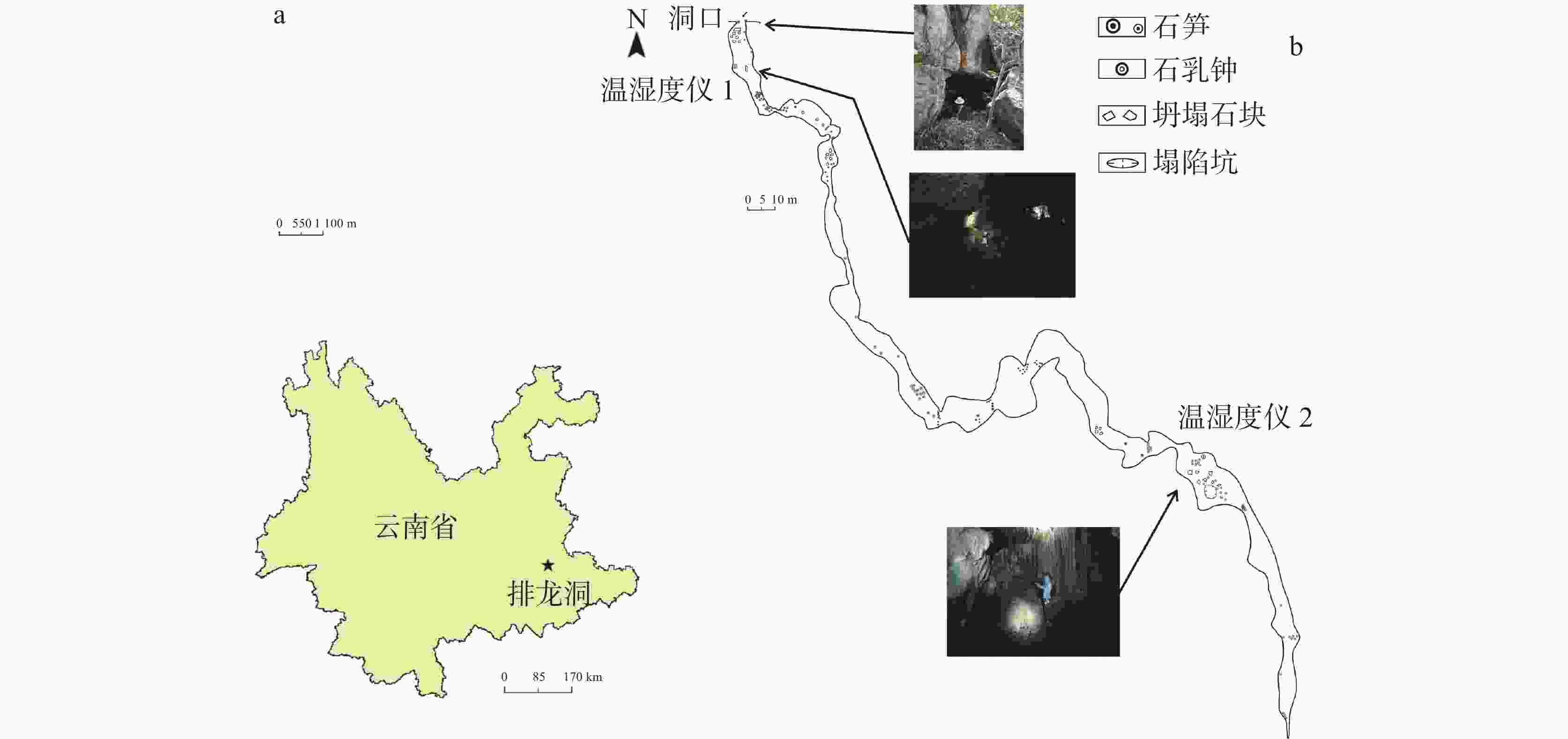
 下载:
下载:
